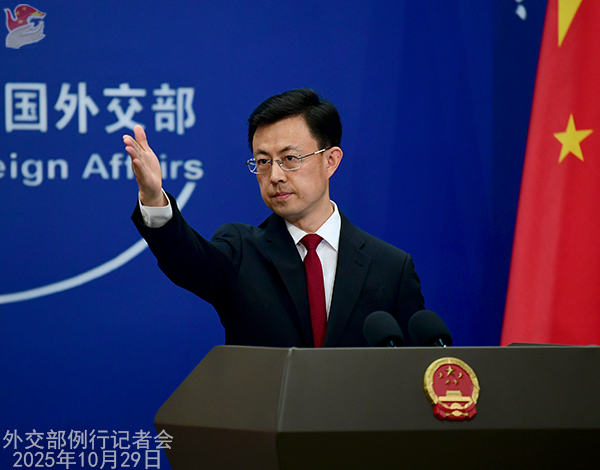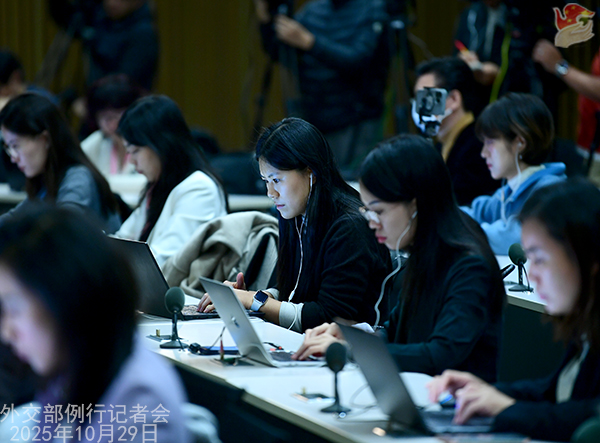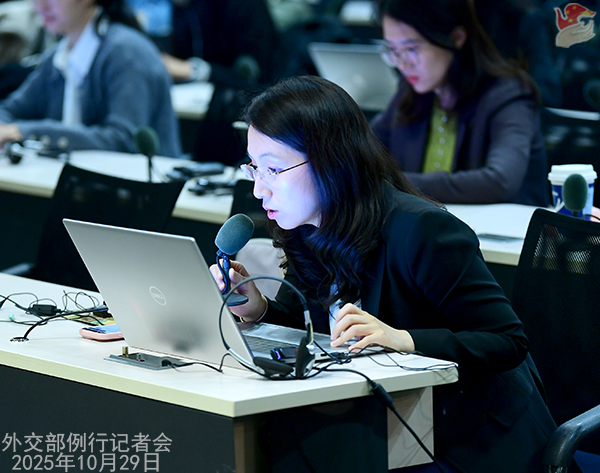Foreign Ministry Spokesperson Guo Jiakun’s Regular Press Conference on October 29, 2025

CCTV: We’ve seen positive progress recently in the Asia-Pacific economic integration process, including the signing of the China-ASEAN Free Trade Area 3.0 Upgrade Protocol and the fifth Regional Comprehensive Economic Partnership Summit which adopted a joint statement. That said, the IMF also warned that the Asia-Pacific remains the fastest-growing region in the world, but higher tariffs and rising protectionism are likely to amplify economic vulnerabilities. How do you view the economic cooperation prospect in the Asia-Pacific and what role will China play?
Guo Jiakun: The Asia-Pacific is the world’s most economically vibrant region and prime growth engine, and a pace-setter in regional cooperation and economic integration. Three years on since the Regional Comprehensive Economic Partnership (RCEP) came into effect, its members have intensified economic and trade cooperation, and the region has maintained rapid economic growth. China and ASEAN have been each other’s top trading partners for five consecutive years. The China-ASEAN Free Trade Area 3.0 Upgrade Protocol signed earlier this week is a major outcome of efforts to strengthen trade ties between the two sides, and will inject more confidence and momentum into regional growth and the global economy. According to latest IMF estimates, the Asia-Pacific is expected to register 4.5 percent growth this year, one of the highest in the world. The region’s growth story demonstrates that openness, cooperation and integrated development are crucial keys to the “Asia-Pacific miracle” and the sure path for regional countries to meet challenges together and create the future they want.
China is a responsible member of the Asia-Pacific family. From high-quality implementation of RCEP to actively seeking to join the Comprehensive and Progressive Agreement for Trans-Pacific Partnership and the Digital Economy Partnership Agreement, from voluntarily matching high-standard international economic and trade rules to upgrading existing free trade agreements, China has been at the forefront of building a Free Trade Area of the Asia-Pacific to empower solidarity and cooperation and enable common development. Just last week, the 20th CPC Central Committee held its fourth plenary session and adopted the recommendations for formulating the 15th Five-Year Plan, which included proposals to open China wider to the world and work faster to facilitate regional and bilateral trade and investment agreements, and expand the network of high-standard free trade areas. China will continue to drive regional economic integration through China’s high-standard opening up, and work towards an Asia-Pacific community with a shared future featuring openness and inclusiveness, innovation-driven growth, greater connectivity, and mutually beneficial cooperation.
AFP: On the meeting between the Chinese and U.S. presidents tomorrow in Busan, South Korea, U.S. President Trump has said he is optimistic and that a lot of problems will be solved. What are China’s expectations for tomorrow’s meeting?
Guo Jiakun: Heads-of-state diplomacy plays an irreplaceable role in providing strategic guidance for China-U.S. relations. President Xi Jinping and President Donald Trump will have in-depth exchange of views on strategic and long-term issues concerning bilateral ties and major issues of mutual interest. China stands ready to work with the U.S. to achieve positive outcomes and provide new guidance and impetus for the steady development of China-U.S. relations. We will release details about the meeting in due course.
Kyodo News: The Chinese president will visit the ROK tomorrow and the Japanese new Prime Minister Sanae Takaichi will also visit the ROK. Will they meet in the ROK?
Guo Jiakun: On the specific meeting you mentioned, I have no information to share at the moment.

AFP: Again on the meeting between the U.S. and Chinese presidents , Donald Trump specifically said that he may talk about lowering fentanyl-related tariffs at the meeting. What is China’s reaction to this?
Guo Jiakun: China’s position on this issue is consistent and clear. In terms of counternarcotics, China has the strongest determination, the most relentless policy and one of the best track records in the world, and China is among the countries that have scheduled the largest number of substances and have the strictest drug control. China expresses sympathy for the fentanyl crisis in America. China provided assistance in this regard which achieved positive results, and remains open to continuing the cooperation with the U.S. The U.S. needs to take concrete actions to create necessary conditions for the cooperation.
AFP: There are reports that China has made its first purchases of soybeans this year from the United States. Can the Foreign Ministry share its comment on this?
Guo Jiakun: China’s position on relevant issue is consistent. I’d refer you to competent authorities for anything specific.
Nippon TV: Regarding yesterday’s telephone conversation between Japanese and Chinese foreign ministers, the Chinese side said it noted the positive signals sent by the new Japanese cabinet. What exactly is the positive signal? Would it be possible to provide us with the specific content?
Guo Jiakun: China has released a readout about the phone call. We noted that the Japanese side said during the phone call that China is an important neighbor of Japan, Prime Minister Sanae Takaichi attaches great importance to Japan-China relations, and Japan never intends to decouple from China or sever the supply chain with China. China values those statements, and hopes that Japan will abide by the principles laid down in the four political documents between China and Japan, and work with China to uphold the political foundation for bilateral ties and continue to improve and develop China-Japan relations in the right direction.
AFP: Nvidia’s CEO Jensen Huang has indicated the desire for U.S. artificial intelligence chips to be sold in China. Would China welcome sales of American AI chips here and what is China’s comment on this?
Guo Jiakun: I’d refer you to competent authorities for the specifics. China has made clear on multiple occasions its principled position on the U.S. chip export to China. We hope the U.S. can take concrete actions to keep global industrial and supply chains stable.

